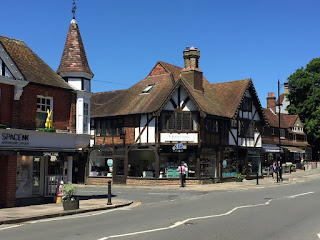 |
| Haslemere High Street |
The County, the country, the country house, the village...
One of the many reasons given for despising Agatha Christie is that “She set all her stories in country houses and English villages and among the aristocracy.” American academics and critics talk about “English country villages” when Dorothy Sayers and Christie set stories in provincial towns – more Haslemere than Linchmere. There is a wonderful description of a rural high street in Third Girl.
In Sayers' Unnatural Death, Miss Climpson goes undercover in a small town, not a village, where the said death has occurred:
“It really is terrible, living in a little town like this,” went on Miss Findlater, “so full of aspidistras, you know, and small gossip. You’ve no idea what a dreadfully gossipy place Leahampton is, Miss Climpson." It certainly boasted an amateur theatrical troupe, and probably a tennis club or two.
Later in the story Miss Findlater is planning to run a chicken farm with her friend Mary Whittaker. Miss Climpson asks: "You mustn’t forget that you’ve been accustomed to see quite a lot of young people in Leahampton. Shan’t you miss the tennis-parties, and the young men, and so on?”
However, Miss Marple always refers to St Mary Mead as a village even though it boasts a high street of shops: butcher, baker, taxi, Post Office, dressmaker – and eventually a supermarket. I wonder why nobody has accused the Queens of setting their stories in the stuffy, hidebound provinces and in suburbs? Perhaps because the provincial towns they depict seem too real, unlike the "fantasy" rural life they are often accused of embracing.
"The County" are the landowners of Sussex, Surrey, Herefordshire or wherever you happen to be. They own big houses verging on the stately home, have grounds with hothouses and vegetable gardens (they were originally entirely self-sufficient), and a lot of land – possibly gifted by Henry VIII once he'd stolen it from the monasteries. The land is rented out, with one farm kept as the "home farm". Colonel Bantry has a home farm belonging to Gossington Hall, and he likes to go and commune with the pigs. The Hall is eventually sold to a film star (The Mirror Crack'd).
In audiobook narration (and later editions) "county" is frequently hypercorrected to "country". Even in Howards End. "On her other side, Sir James Bidder sat, repeating that she only had to give the word, and he would whip up the county families for twenty miles round. Whether Sir James, who was Garden Seeds, had promised what he could perform, she doubted, but so long as Henry mistook them for the county families when they did call, she was content."
Did Christie set all her novels in "country houses"? To my mind a "country house" is the kind of stately home discussed in Mark Girouard's The English Country House. They became too expensive to run, some are now open to the public, some are run as wedding venues, and several were destroyed in "mysterious fires". In Christie's work, a lot of political wheeling and dealing takes place in a “country house”. See The Seven Dials Mystery.
I once met some lovely American ladies who were fans of Dorothy Sayers, and thought it was so democratic of Lord Peter Wimsey to drop his Gs, just like the working classes. It was an aristocratic habit of Edwardian times and earlier.
“Why did you think it was more likely to be Carruthers than Granby? You’d never seen either of them.”
“Well,” I said. “It was the g’s. You said she dropped her g’s. Now, that’s done by a lot of hunting people in books, but I don’t know many people who do it in reality—and certainly no one under sixty. You said this woman was forty. Those dropped g’s sounded to me like a woman who was playing a part and overdoing it.”
(Miss Marple Tells a Story)
More here, and links to the rest.
 |
| Linchmere: X marks my window |